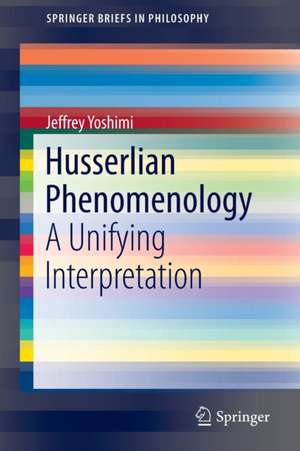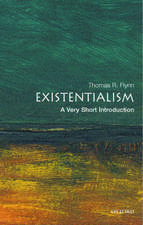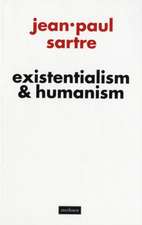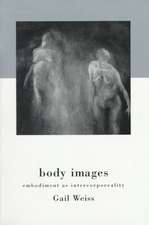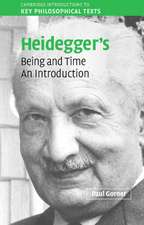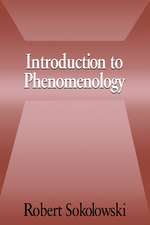Husserlian Phenomenology: A Unifying Interpretation: SpringerBriefs in Philosophy
Autor Jeffrey Yoshimien Limba Engleză Paperback – 19 ian 2016
Din seria SpringerBriefs in Philosophy
-
 Preț: 345.63 lei
Preț: 345.63 lei - 17%
 Preț: 359.60 lei
Preț: 359.60 lei -
 Preț: 345.90 lei
Preț: 345.90 lei -
 Preț: 378.54 lei
Preț: 378.54 lei -
 Preț: 348.79 lei
Preț: 348.79 lei -
 Preț: 376.59 lei
Preț: 376.59 lei -
 Preț: 377.73 lei
Preț: 377.73 lei -
 Preț: 411.54 lei
Preț: 411.54 lei - 15%
 Preț: 463.68 lei
Preț: 463.68 lei -
 Preț: 378.12 lei
Preț: 378.12 lei -
 Preț: 376.80 lei
Preț: 376.80 lei -
 Preț: 440.86 lei
Preț: 440.86 lei -
 Preț: 375.45 lei
Preț: 375.45 lei -
 Preț: 341.86 lei
Preț: 341.86 lei -
 Preț: 444.13 lei
Preț: 444.13 lei -
 Preț: 376.80 lei
Preț: 376.80 lei -
 Preț: 377.73 lei
Preț: 377.73 lei -
 Preț: 408.05 lei
Preț: 408.05 lei -
 Preț: 375.07 lei
Preț: 375.07 lei -
 Preț: 377.35 lei
Preț: 377.35 lei -
 Preț: 481.79 lei
Preț: 481.79 lei -
 Preț: 413.66 lei
Preț: 413.66 lei - 15%
 Preț: 463.85 lei
Preț: 463.85 lei -
 Preț: 380.84 lei
Preț: 380.84 lei -
 Preț: 376.59 lei
Preț: 376.59 lei -
 Preț: 376.22 lei
Preț: 376.22 lei -
 Preț: 376.80 lei
Preț: 376.80 lei -
 Preț: 349.10 lei
Preț: 349.10 lei -
 Preț: 348.79 lei
Preț: 348.79 lei -
 Preț: 377.18 lei
Preț: 377.18 lei -
 Preț: 132.39 lei
Preț: 132.39 lei -
 Preț: 380.25 lei
Preț: 380.25 lei -
 Preț: 380.25 lei
Preț: 380.25 lei -
 Preț: 475.83 lei
Preț: 475.83 lei -
 Preț: 378.12 lei
Preț: 378.12 lei -
 Preț: 378.34 lei
Preț: 378.34 lei -
 Preț: 379.68 lei
Preț: 379.68 lei -
 Preț: 343.00 lei
Preț: 343.00 lei -
 Preț: 377.73 lei
Preț: 377.73 lei - 20%
 Preț: 321.52 lei
Preț: 321.52 lei -
 Preț: 343.33 lei
Preț: 343.33 lei -
 Preț: 481.05 lei
Preț: 481.05 lei -
 Preț: 379.68 lei
Preț: 379.68 lei -
 Preț: 377.57 lei
Preț: 377.57 lei -
 Preț: 475.83 lei
Preț: 475.83 lei -
 Preț: 407.52 lei
Preț: 407.52 lei - 15%
 Preț: 461.73 lei
Preț: 461.73 lei -
 Preț: 345.63 lei
Preț: 345.63 lei -
 Preț: 379.86 lei
Preț: 379.86 lei
Preț: 376.80 lei
Nou
Puncte Express: 565
Preț estimativ în valută:
72.10€ • 75.47$ • 60.01£
72.10€ • 75.47$ • 60.01£
Carte tipărită la comandă
Livrare economică 31 martie-14 aprilie
Preluare comenzi: 021 569.72.76
Specificații
ISBN-13: 9783319266961
ISBN-10: 3319266969
Pagini: 91
Ilustrații: VIII, 91 p. 13 illus. in color.
Dimensiuni: 155 x 235 x 5 mm
Greutate: 0.15 kg
Ediția:1st ed. 2016
Editura: Springer International Publishing
Colecția Springer
Seria SpringerBriefs in Philosophy
Locul publicării:Cham, Switzerland
ISBN-10: 3319266969
Pagini: 91
Ilustrații: VIII, 91 p. 13 illus. in color.
Dimensiuni: 155 x 235 x 5 mm
Greutate: 0.15 kg
Ediția:1st ed. 2016
Editura: Springer International Publishing
Colecția Springer
Seria SpringerBriefs in Philosophy
Locul publicării:Cham, Switzerland
Public țintă
ResearchCuprins
Chapter 1: Introduction.- Chapter 2: The Basic Idea and Other Preliminaries.- Chapter 3: The Formalism.- Section 3.1: The Dynamical Systems Framework.- Section 3.2: Expectation Rule.- Section 3.3: Expected Visual Continuations and Trail Sets.- Section 3.4: Learning Rule.- Chapter 4: Textual Analysis.- Chapter 5: Intentionality.- Section 5.1: Intentionality in General.- Section 5.2: The Dynamics of Intentionality.- Chapter 6: Constitutive Phenomenology.- Section 6.1: Constitution in General.- Section 6.2: Constitution as Construction.- Section 6.3: Constitutive Phenomenology as a Research Program.- Chapter 7: Horizon Theory.- Section 7.1: Three senses of ‘Horizon’.- Section 7.2: Horizon Dynamics.- Chapter 8: Motivation.- Section 8.1: Motivated Possibilities.- Section 8.2: Examples.- Section 8.3: Learning and Motivation.- Chapter 9: Genetic Phenomenology.- Chapter 10: Conclusion.- Section 10.1: The Unifying Interpretation.- Section 10.2: Other Constitutive Domains.- Section 10.3: OtherConcepts in Husserlian phenomenology.- Section 10.4: Naturalized Phenomenology.- Section: 10.5 Other Applications.- Appendix: Search Method.- References
Notă biografică
Jeff Yoshmi is an Associate Professor of philosophy and cognitive science at UC Merced. In 2004 he joined the Merced campus (which opened to undergraduates in 2005) as a founding faculty member, and subsequently helped build the cognitive and information sciences program in to a world class program. He does interdisciplinary work at the intersection of philosophy and cognitive science, drawing on Husserlian phenomenology, dynamical systems theory, and computer modeling and visualization. His overarching research project is to understand how the dynamics of consciousness are related to the dynamics of neural activity. He believes a formalized Husserlian phenomenology is key to this project.
Caracteristici
Is the only book using detailed quantitative analysis of keyword searches in Husserl Provides a brief (less than 100 page) formal overview of Husserlian phenomenology Is the most detailed dynamical systems analysis of Husserl to date Uses mathematical functions to show the unity in Husserl’s vast literary output Includes supplementary material: sn.pub/extras
